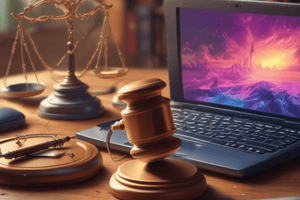Podcast
Questions and Answers
The U.S. criminal justice system has existed for over 150 years.
The U.S. criminal justice system has existed for over 150 years.
True (A)
All crime-related television programs are based on true stories.
All crime-related television programs are based on true stories.
False (B)
The terrorist attacks on September 11, 2001, had no effect on Americans' perception of safety and security.
The terrorist attacks on September 11, 2001, had no effect on Americans' perception of safety and security.
False (B)
Approximately 1.2 million serious criminal offenses reported to the FBI each year involve violence.
Approximately 1.2 million serious criminal offenses reported to the FBI each year involve violence.
Fictional crime stories always accurately represent the realities of the justice system.
Fictional crime stories always accurately represent the realities of the justice system.
Crime can transcend national borders, affecting international relations.
Crime can transcend national borders, affecting international relations.
The major components of the criminal justice system include police, courts, and legislation.
The major components of the criminal justice system include police, courts, and legislation.
Millions of less serious criminal offenses go unreported each year.
Millions of less serious criminal offenses go unreported each year.
The three-strikes law in California originally resulted in life sentences for only violent offenses.
The three-strikes law in California originally resulted in life sentences for only violent offenses.
Public support for punitive policies like the three-strikes law may increase if they disproportionately affect Black defendants.
Public support for punitive policies like the three-strikes law may increase if they disproportionately affect Black defendants.
The three-strikes law has been proven to significantly reduce crime rates across the states that adopted it.
The three-strikes law has been proven to significantly reduce crime rates across the states that adopted it.
Approximately 40% of incarcerated persons serving life sentences under the three-strikes rule are mentally ill.
Approximately 40% of incarcerated persons serving life sentences under the three-strikes rule are mentally ill.
Californians voted in November 2012 to soften the three-strikes law regarding nonviolent offenses.
Californians voted in November 2012 to soften the three-strikes law regarding nonviolent offenses.
The Consensus Theory of Justice suggests that laws are largely accepted without dissent among the general population.
The Consensus Theory of Justice suggests that laws are largely accepted without dissent among the general population.
The three-strikes law resulted in an estimated additional cost of $10 billion to taxpayers over a decade.
The three-strikes law resulted in an estimated additional cost of $10 billion to taxpayers over a decade.
High-profile crimes tend to influence lawmakers and their decisions regarding justice policies.
High-profile crimes tend to influence lawmakers and their decisions regarding justice policies.
Richard Allen Davis is considered less violent than most other lawbreakers in society.
Richard Allen Davis is considered less violent than most other lawbreakers in society.
The stability of the government over 200 years indicates a fair degree of consensus about its legitimacy.
The stability of the government over 200 years indicates a fair degree of consensus about its legitimacy.
The annual spending on criminal justice in the United States exceeds $300 billion.
The annual spending on criminal justice in the United States exceeds $300 billion.
Kalief Browder was tried and convicted before spending time in solitary confinement.
Kalief Browder was tried and convicted before spending time in solitary confinement.
Justice is often seen as a valuable pursuit, regardless of the cost involved.
Justice is often seen as a valuable pursuit, regardless of the cost involved.
The three-strikes law was intended to be a lenient approach to dealing with repeat offenders.
The three-strikes law was intended to be a lenient approach to dealing with repeat offenders.
Lawmakers rarely change criminal laws in response to social or economic changes.
Lawmakers rarely change criminal laws in response to social or economic changes.
Efforts have been made to divert individuals from traditional criminal justice responses.
Efforts have been made to divert individuals from traditional criminal justice responses.
The three-strikes law was first proposed in response to a violent crime involving Polly Klaas.
The three-strikes law was first proposed in response to a violent crime involving Polly Klaas.
Supporters believed that the three-strikes law would decrease crime rates effectively.
Supporters believed that the three-strikes law would decrease crime rates effectively.
Kalief Browder spent a total of three years in the juvenile justice system.
Kalief Browder spent a total of three years in the juvenile justice system.
The enforcement of criminal laws is the main driver of the criminal justice process.
The enforcement of criminal laws is the main driver of the criminal justice process.
Changes to criminal laws have not faced any challenges historically.
Changes to criminal laws have not faced any challenges historically.
The criminal justice system has never faced criticism regarding its treatment of minority groups.
The criminal justice system has never faced criticism regarding its treatment of minority groups.
Alternative approaches to crime have become more popular since the 1990s.
Alternative approaches to crime have become more popular since the 1990s.
Barack Obama signed an executive order to ban solitary confinement for adults in federal prisons.
Barack Obama signed an executive order to ban solitary confinement for adults in federal prisons.
Flashcards
U.S. Criminal Justice System
U.S. Criminal Justice System
The system in the United States responsible for upholding laws, addressing crime, and managing criminals.
Criminology
Criminology
The study of crime and the criminal justice system, including causes, consequences, and responses.
Criminal Justice Process
Criminal Justice Process
The process of identifying, apprehending, and processing suspected criminals.
Violent Crimes
Violent Crimes
Signup and view all the flashcards
Property Crimes
Property Crimes
Signup and view all the flashcards
Law Enforcement
Law Enforcement
Signup and view all the flashcards
Courts
Courts
Signup and view all the flashcards
Corrections
Corrections
Signup and view all the flashcards
Three-Strikes Law
Three-Strikes Law
Signup and view all the flashcards
Consensus vs. Conflict Debate
Consensus vs. Conflict Debate
Signup and view all the flashcards
Consensus Theory of Justice
Consensus Theory of Justice
Signup and view all the flashcards
Conflict Theory of Justice
Conflict Theory of Justice
Signup and view all the flashcards
National Impact of Injustice
National Impact of Injustice
Signup and view all the flashcards
Political Influence on Justice
Political Influence on Justice
Signup and view all the flashcards
Legislative and Law Enforcement Powers
Legislative and Law Enforcement Powers
Signup and view all the flashcards
Just and Legal System
Just and Legal System
Signup and view all the flashcards
Criminal Law
Criminal Law
Signup and view all the flashcards
Crime Control Model
Crime Control Model
Signup and view all the flashcards
Due Process Model
Due Process Model
Signup and view all the flashcards
Four-Tier Model
Four-Tier Model
Signup and view all the flashcards
Discretion
Discretion
Signup and view all the flashcards
Ethics
Ethics
Signup and view all the flashcards
Diversion
Diversion
Signup and view all the flashcards
Beyond a Reasonable Doubt
Beyond a Reasonable Doubt
Signup and view all the flashcards
Plea Bargain
Plea Bargain
Signup and view all the flashcards
Jury Trial
Jury Trial
Signup and view all the flashcards
Double Jeopardy
Double Jeopardy
Signup and view all the flashcards
Warrant Requirement
Warrant Requirement
Signup and view all the flashcards
Right to Counsel
Right to Counsel
Signup and view all the flashcards
Study Notes
U.S. Criminal Justice System
- Existed for over 150 years, influencing culture and international interactions.
- Millions of serious crimes are reported annually to the FBI, with a significant portion involving violence and property damage.
- Crime often transcends borders and impacts all Americans.
- The system consumes substantial resources (over $300 billion annually and employs 2.4 million).
Impact of Media on Understanding
- Fictional and real-life crime dramas provide information about the system but can be misleading.
- Television series and movies explore criminal behavior, justice system responses, and different punishments.
Reasons for Studying the Criminal Justice System
- Essential to understanding and participating in a democratic society.
- Impacts individual lives and societal well-being.
- Necessary to understand how tax dollars support the system.
- Knowing how our justice system handles offenders is crucial.
Foundations of Criminal Justice: Legal and Historical Bases
- Criminal law defines crimes and punishments.
- Social, political, and economic changes drive new laws and advancements.
- Criminal justice agencies need tools to address evolving crime challenges (e.g., new technology, drugs).
- Historical principles guide law, but also sometimes challenge that process.
The Criminal Law: How it Changes
- Kalief Browder's case highlights the issue of excessive detention and delays in the justice system.
- Browder's prolonged solitary confinement resulted in mental health issues and ultimately contributed to his death.
- Societal response to abuses of the justice system (e.g., Browder, Rikers Island) led to initiatives addressing overtaxed systems—including diversion programs attempting to avoid traditional responses.
Diversion and Alternatives to Incarceration
- New laws and programs are emerging to divert people away from incarceration through treatment for underlying issues or decriminalization of low-severity infractions.
- The "tough-on-crime" policies of the 1990s are being reevaluated.
Three-Strikes Laws
- Origins of three-strikes laws, for example, the case of Polly Klaas.
- Significant concerns emerged regarding the disproportionate impact on minority defendants and expensive implications for prisons.
- Studies show the programs did not reduce crime and could severely affect taxpayers.
- Californian voters later attempted to reform the law.
Politics and the Justice System
- Politics often influences legislative decisions.
- Decisions can be driven by reelection desires, limited information, or immediate reactions to events.
- Events like Kalief Browder's detention and Polly Klaas's murder can heavily influence public perception and legal changes.
The Consensus vs. Conflict Debate
- Key question of whether criminal justice is based on consensus or conflict.
- Consensus theory argues that most people accept the legitimacy of the system without challenge.
- This understanding, however, does not necessarily address the impact of injustice on specific communities.
Studying That Suits You
Use AI to generate personalized quizzes and flashcards to suit your learning preferences.





